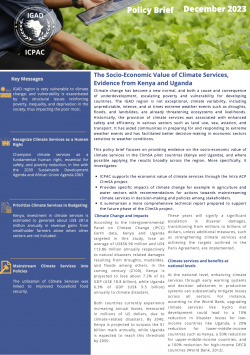
Read the full Policy Brief (PDF)
Summary
Climate change has become a new normal, and both a cause and consequence of underdevelopment, escalating poverty and vulnerability for developing countries. The IGAD region is not exceptional, climate variability, including unpredictable, intense, and at times extreme weather events such as droughts, floods, and landslides, are already threatening ecosystems and livelihoods. Historically, the provision of climate services was associated with enhanced safety and efficiency in various sectors such as land use, sea, aviation, and transport. It has aided communities in preparing for and responding to extreme weather events and has facilitated better decision-making in economic sectors sensitive to weather conditions.
This policy brief focuses on providing evidence on the socio-economic value of climate services in the ClimSA pilot countries (Kenya and Uganda), and where possible applying the results broadly across the region. More specifically, it investigates:
- ICPAC supports the economic value of climate services through the Intra ACP ClimSA project.
- Provides specific impacts of climate change for example in agriculture and water sectors with recommendations for actions towards mainstreaming climate services in decision-making and policies among stakeholders.
- It summarises a more comprehensive technical report prepared to support the future phase of the ClimSA project.
Key messages
- The IGAD region is very vulnerable to climate change; and vulnerability is exacerbated by the structural issues reinforcing poverty, inequality, and deprivation in the society, thus impacting the poor most.
- Champion climate services as a fundamental human right, essential for safety, and poverty reduction, in line with the 2030 Sustainable Development Agenda and African Union Agenda 2063.
- Prioritize Climate Services in Budgeting: In Kenya, investment in climate services is estimated to generate about US$ 281.6 million annually in revenue gains from smallholder farmers alone when other sectors are not included.
- Mainstream Climate Services into Policies The utilization of Climate Services was linked to improved household food security.